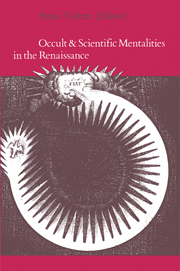Book contents
- Frontmatter
- Contents
- List of contributors
- Editor's preface
- Introduction
- 1 At the crossroads of magic and science: John Dee's Archemastrie
- 2 The occult tradition in the English universities of the Renaissance: a reassessment
- 3 Analogy versus identity: the rejection of occult symbolism, 1580–1680
- 4 Marin Mersenne: Renaissance naturalism and Renaissance magic
- 5 Nature, art, and psyche: Jung, Pauli, and the Kepler–Fludd polemic
- 6 The interpretation of natural signs: Cardano's De subtilitate versus Scaliger's Exercitationes
- 7 Kepler's attitude toward astrology and mysticism
- 8 Kepler's rejection of numerology
- 9 Francis Bacon's biological ideas: a new manuscript source
- 10 Newton and alchemy
- 11 Witchcraft and popular mentality in Lorraine, 1580–1630
- 12 The scientific status of demonology
- 13 “Reason,” “right reason,” and “revelation” in midseventeenth-century England
- Index
Introduction
Published online by Cambridge University Press: 12 January 2010
- Frontmatter
- Contents
- List of contributors
- Editor's preface
- Introduction
- 1 At the crossroads of magic and science: John Dee's Archemastrie
- 2 The occult tradition in the English universities of the Renaissance: a reassessment
- 3 Analogy versus identity: the rejection of occult symbolism, 1580–1680
- 4 Marin Mersenne: Renaissance naturalism and Renaissance magic
- 5 Nature, art, and psyche: Jung, Pauli, and the Kepler–Fludd polemic
- 6 The interpretation of natural signs: Cardano's De subtilitate versus Scaliger's Exercitationes
- 7 Kepler's attitude toward astrology and mysticism
- 8 Kepler's rejection of numerology
- 9 Francis Bacon's biological ideas: a new manuscript source
- 10 Newton and alchemy
- 11 Witchcraft and popular mentality in Lorraine, 1580–1630
- 12 The scientific status of demonology
- 13 “Reason,” “right reason,” and “revelation” in midseventeenth-century England
- Index
Summary
The scholars who took part in this symposium addressed themselves to a topic that has been much discussed in the history of science in the past twenty years. The extent to which the two great realms of “magic” and “science” – to give them their traditional names – influenced each other during the Renaissance is a fascinating and exciting question. One can distinguish, perhaps, three main stages in its elaboration so far. In the first the history of science was seen as a narrative of progress through inventions and discoveries, an ever-improving movement toward positive knowledge. In this history of scientific triumphs, magic and the occult could be simply dismissed as entertaining but irrelevant. Even as late as 1957 Herbert Butterfield, in The Origins of Modern Science, felt no qualms about dismissing the occult tradition and its historiographers in the most sweeping terms. Van Helmont, we are told,
made one or two significant discoveries, but these are buried in so much fancifulness – including the view that all bodies can ultimately be resolved into water – that even twentieth-century commentators on Van Helmont are fabulous creatures themselves, and the strangest things in Bacon seem rationalistic and modern in comparison. Concerning alchemy it is more difficult to discover the actual state of things, in that the historians who specialise in this field seem sometimes to be under the wrath of God themselves; for, like those who write on the Bacon–Shakespeare controversy or on Spanish politics, they seem to become tinctured with the kind of lunacy they set out to describe.
- Type
- Chapter
- Information
- Occult Scientific Mentalities , pp. 1 - 56Publisher: Cambridge University PressPrint publication year: 1984
- 5
- Cited by



